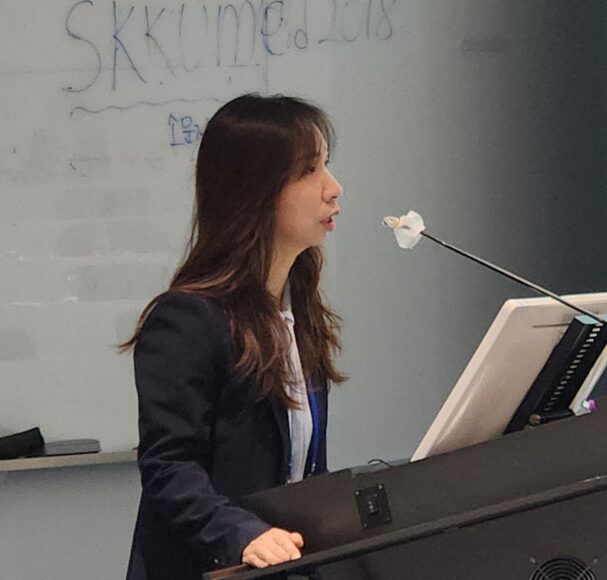Korean Society of Sexology Fall Conference held
input 2024.11.18 14:23
input 2024.11.18 14:23correction 2024.11.18 14:27
Jeongsook Yoon, head of the Crime Analysis and Research Department at the Korea Institute of Criminology and Justice, is giving a presentation on deepfake sex crimes. Photo = Reporter Kim Min-ji
It was suggested that artificial intelligence (AI) literacy education should be provided to prevent deepfake sexual crimes among teenagers. It is pointed out that since this is an age group that is friendly to AI and uses it without much attention, it is necessary to develop ethical thinking skills about it.
Jeong-Sook Yoon, head of the Crime Analysis and Research Department at the Korea Institute of Criminology and Legal Policy, made a presentation on the topic of ‘deepfake sex crimes’ at the 2024 Korean Society of Sexology Fall Conference held on the 17th.
Researcher Yoon said, “The accessibility of minors to crime is increasing,” and “In the past, advanced technology was needed for compositing, but today, with the development of artificial intelligence technology, anyone is producing false videos through deepfake bots.” .
In fact, the proportion of teenagers among deepfake sex crime perpetrators is increasing.
He said, “According to the National Police Agency’s announcement, the proportion of teenage suspects in deepfake sex crimes is increasing,” and “teenage suspects were 65.4% in 2021, increasing to 61.2% in 2022, 75.8% last year, and 73.6% as of July this year. “It is increasing,” he said.
Researcher Yoon cited the fact that teenagers are a digital native generation and that their identity has not yet been fully formed as the reason for this phenomenon.
He said, “Current teenagers are the digital native generation who use digital environments such as computers, mobile phones, and the Internet as part of their daily lives from birth.” He added, “Children have been learning coding since elementary school and have grown into a generation friendly to artificial intelligence. . “With technology becoming easily accessible and usable, the accessibility to crime is also increasing,” he explained.
He continued, “During the teenage years, there is a lot of sexual curiosity and an immature ego is formed, so they often do not know what consequences their behavior using technology will bring.” He added, “If adults do not teach them, anyone can inadvertently become a potential perpetrator.” “It is a situation that exists,” he pointed out.
In addition, the problem is that deepfake sex crimes are not taken seriously and are perceived as a mischievous entertainment culture. Accordingly, Researcher Yoon mentioned the need for artificial intelligence literacy education that fosters young people’s ethical thinking skills regarding artificial intelligence technology.
He said, “We need to provide literacy education for youth, including the potential risks and ethical aspects of artificial intelligence technology,” and added, “In addition, they need to develop self-control when interacting with artificial intelligence, so they can actively use it or reject it as needed.” “We need to make sure we have it,” he said.
Additionally, Researcher Yoon said, “The government needs to change its perspective on artificial intelligence.” He added, “The government is promoting a project to develop technology to respond to digital dysfunction, but only reflected KRW 3 billion in next year’s budget, which is KRW 1.2 billion less than this year. “This can be seen as a focus on strengthening technology and a lack of interest in preventing adverse effects,” he pointed out.
Copyrightⓒ Honest knowledge for health. Comedy.com kormedi.com / Reproduction and redistribution, AI learning and use prohibited
Healthy and responsible manner. The intersection of technology and sexuality is complex, and we must provide guidance to help teenagers understand and cope with these challenges.
Interviewer: Hello ladies and gentlemen, welcome to today’s interview with Dr. Jeongsook Yoon, head of the Crime Analysis and Research Department at the Korea Institute of Criminology and Justice, and Dr. Jane Lee, a renowned sexologist and professor at Seoul National University. We are fortunate to have them here to discuss the Korean Society of Sexology Fall Conference and its implications on the rise of deepfake sex crimes among teenagers.
Dr. Jeongsook Yoon, could you start by providing us with an overview of your presentation at the conference? What key points did you highlight about deepfake sex crimes and their prevalence among teenagers?
Dr. Jeongsook Yoon: Certainly. As I mentioned in my presentation, deepfake sex crimes have become increasingly common due to the accessibility of technology and the lack of awareness about their potential consequences. Teenagers are particularly vulnerable to these crimes as they are digital natives, growing up exposed to technology from a young age and having limited knowledge about ethical use. Our research showed that the proportion of teenage suspects in deepfake sex crimes has been gradually increasing over the years. This is due to their immature egos and the belief that such activities are merely a mischievous form of entertainment. I emphasized the need for artificial intelligence literacy education to foster ethical thinking and self-control among youth, as well as the importance of changing the government’s perspective on AI development to prioritize prevention of adverse effects.
Interviewer: Dr. Jane Lee, as a sexologist, what are your thoughts on Dr. Yoon’s presentation and the implications of deepfake sex crimes on teenagers’ sexual development and behavior?
Dr. Jane Lee: I believe that Dr. Yoon’s research highlights a crucial issue that we must address as a society. Teenagers today are constantly exposed to sexual content online, which can normalize inappropriate behavior and desensitize them to the harm caused by these crimes. We need to educate teenagers about consent, boundaries, and the potential harms of deepfake technology. It’s also important to create spaces where they can discuss these issues openly and learn how to navigate their sexuality in a


